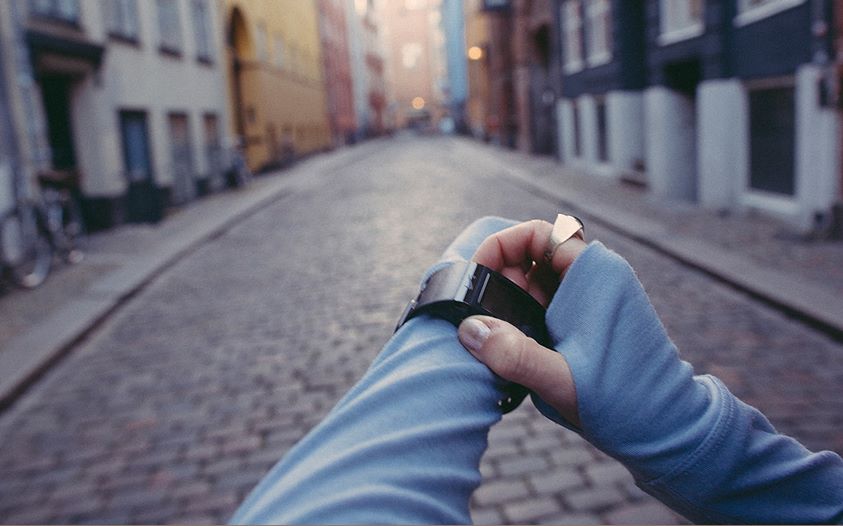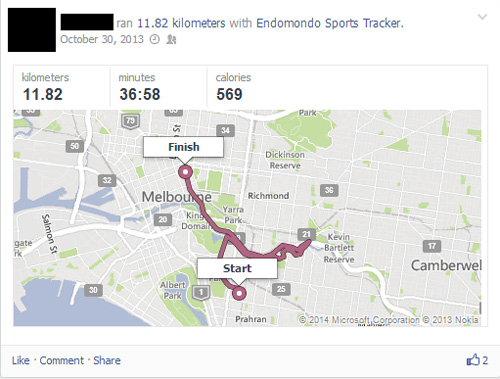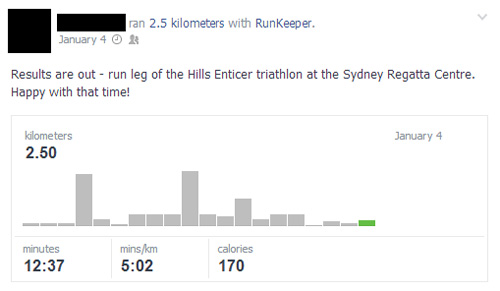Is social media sports spam the best we can do?
Guest Post: Patrick Johnson works for Go Mammoth, a sports and social club aiming to make fitness fun. When he isn’t playing sport, Patrick can mainly be found…watching sport.
We’ve all been there: You log onto Facebook, Twitter, or any one of your other social media sites, ready to read the witty musings of your friends and families.
As you click through pictures of babies, weddings, exotic vacations, and recent cooking adventures, you find yourself staring at post after post proclaiming recent fitness accomplishments: everything from miles run through a blinding snowstorm to laps swam in the local pool. Is this anything more than simple spam?
Social Media Sports Snobs?
Of course, these posts started out harmless enough. Your best friend tried her first Zumba class, and you quickly congratulated her for branching out. Then your uncle completed his first half-marathon and received multiple likes on Facebook.
Soon your best friend is posting pictures from her all-night Zumbathon, and your uncle is sharing his improving times and increasing mileage after each day’s run. How did their athletic achievements end up spamming your life?
Caption: Less than 37 minutes! I’m so pleased for you. And what a pretty graph
Is it a deliberate attempt to show off? Is this sports snobbery of the social kind? Probably not, but then again why do they think this information is interesting to anyone other than themselves?
There seems to be hundreds of these apps that spam your timeline: Fitocracy, Daily Mile, Map My Fitness, Nike+, Endomondo, RunKeeper, Adidas MiCoach, Fitbit…the list goes on and on. Sure, they have some nice features and can post some cool graphs, but does anyone actually care?
Caption: I’m so pleased you are happy with your time. Now I can get on with my day.
Perhaps it is a form of self-motivation? By regularly posting about your activity, you make yourself feel obliged to keep doing it and keep posting. A bit of backwards logic there perhaps, but either way – I can’t be the only person that finds these posts annoying.
Are Tracking Devices a Good Thing?
For anyone interested in self-improvement, undoubtedly the answer to this is yes. If you don’t measure what you are doing, you can’t figure out what you might need to change in order to improve and progress. Marathon runner Julie Price gave a great talk for Quantified Self on what she learned from tracking 10 years of running:
[vimeo]http://vimeo.com/79674486[/vimeo]
The Role of Social
Whilst tracking your activity can clearly have huge benefits for the individual user, most of this data is only useful to them. Incessant sharing of run times or cycle distances really isn’t very engaging to others, but does that mean that social has no role to play?
Social media is here to stay, and perhaps most importantly, the younger generation have grown up with it and live in it practically 24/7. With alarming health and fitness issues becoming so frequently reported on, there has been a renewed focus in recent years to get people active, and in particular – to get children active.
One of the benefits of tracking apps is that game theory can be applied – either for self-set goals, or, more pointedly, for competitions and leaderboards against friends. This could become a great way to get kids more interested in sport. In particular, using this sort of concept as an intervention tactic for children with health problems could be very powerful.
Tying The Knot
Whilst gamification can be effective, a few virtual badges are unlikely to motivate many adults to use a particular service. I feel that a great way to tie this problem together could be to try and integrate social commerce.
Utilising the social communities using your sports app, you could partner up with a healthy food outlet and offer vouchers based on activity/performance. Rather than just winning virtual badges for beating your friends, you could win actual products from the Nike store.
If a company such as Nike wanted to run a corporate responsibility campaign, they could instead offer charity donations based on distance ran – or perhaps more appropriate would be ‘amount improved’.
The implications of these sort of ideas make it clear to me that social clearly has a role to play in fitness tracking – and encouraging greater fitness uptake – but it might require the companies and individuals involved to think a little bit beyond the simple share.
About author
You might also like
SPORTEL 2021: Day One Recap
This year’s prestigious SPORTEL convention kicked off in sunny Monaco today, welcoming a host of familiar faces as well as plenty of new ones. Doors opened at 8:30am with businesses
Six Founding Riders Set To Bring The Vision Of The UCI Track Champions League To Life
Olympic Champions, UCI World Champions and World Record holders join the new track cycling competition debuting in November 2021 The UCI Track Champions League is delighted to announce that six
Sports related spending to soar this summer as pre-pandemic life resumes
New insights from eBay Ads UK reveal the potential for brands to engage with an excited but nervous nation as sports events get back on track As pubs and indoor










